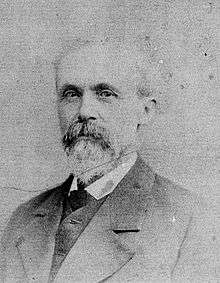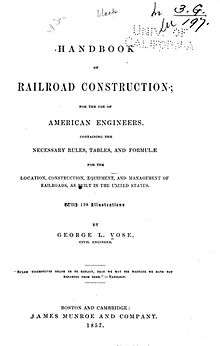George L. Vose

George Leonard Vose (19 April 1831 – 1910) was a United States civil engineer and Professor of Civil Engineering at Bowdoin College and Massachusetts Institute of Technology, known as educator in the field of railroads,[1][2] and from his "Manual for railroad engineers and engineering students" (1873).[3][4]
Biography
Born in Augusta, Maine, Vose was educated at home and in Salem, Massachusetts. From 1849 to 1850 he studied at the Lawrence Scientific School of Harvard College.[1]
After Harvard Vose started his career as assistant engineer on the Kennebec and Portland Railroad, and until 1859 was engaged on various railroads. From 1859 to 1863, he was associate editor of The American Railway Times in Boston, and then for three years he resided in Salem, Massachusetts. In 1866, he moved to Paris, Maine, and was occupied with railroad projects in Maine and New Hampshire. Vose was professor of civil engineering in Bowdoin College from 1872 until 1881, and held a similar chair in the Massachusetts Institute of Technology from 1881 until 1886.[1][2]
Vose's daughter Harriet Lenora Vose was married to Arlo Bates.[5] Vose Spur, a subpeak of Mount Carrigain, is named for him.
Work
Handbook of Railroad Construction, 1857

The subtitle of the "Handbook of railroad construction: for the use of American engineers. Containing the necessary rules, tables, and formulæ for the location, construction, equipment, and management of railroads, as built in the United States." already explains the purpose and content of this work. It wants to offer rules, tables, and formulæ for the location, construction, equipment, and management of railroads. In the Preface Vose further explains that:
- ... the object of this work was to give in the plainest possible manner all instructions, rules, and tables necessary for the location, construction, equipment, and management of railroads.
- As a general thing, American engineers are not educated for their business ; and when they do possess a knowledge of pure science, they are at a loss how to apply it.
- The reader is presumed acquainted with the elements of arithmetic, geometry, algebra, and mechanics ; being thus provided, he will, by a perusal of what follows, be enabled to correctly proportion bridges, of wood, stone, and iron ; abutments, piers, retaining walls, superstructure, and locomotive engines; aud to plan and lay out, execute, and estimate any description of work occurring upon railroads.
- As the object has been more to be useful than original, the best engineering writers and experimenters have been consulted ; among whom are, — Gauthey, Navier, Vicat, Tredgold, Barlow, Totten, Fairbairn, Hodgkinson, Clark, and Lardner. Also a great number of reports by American civil engineers upon railroad matters. [6]
Vose further explains that the work is written as "handbook" and not a "treatise", more meant as office companion than as a text-book for students.[6] Fifteen years later he renewed this work, entitled "Manual for railroad engineers and engineering students : containing the rules and tables needed for the location, construction, and equipment of railroads as built in the United States". This work had the similar table of content but was prepared for both railroad engineers and engineering students.[7]
Management


The last chapter of the 1857 handbook was devoted to management. In there Vose started explaining that railroad management can be divided into two grand section:
The financial management embraces the entire systems of accounts, and relates to everything to:[8]
- Adjusting the tariffs
- The transport of passengers and freight
- Ticket and receiving offices, steamboat, stage, and railroad connections.
The operating or operations management relates to:[9]
- Maintaining the road-bed, superstructure, bridging, masonry, buildings, and fixed stock in working order
- Making all repairs, renewals, enlargements and alterations
- Purchase, inspection, maintaining, and operating of the rolling stock.
Vose further goes into the general principles for efficient operation, a part extracted from McCallum (1856). The rate and direction of subordination is presented with a functional organization structure (see image), in which the General Superintendent is in charge. Vose had notified earlier, that financial management does not properly come in his days.[10] And indeed, the financial management function is not incorporated into the organisational structure pictured.
Special feature of the 1857 Handbook, were two classification charts of the organisation and the costs of a railroad (see images) given in its last chapter on management. After explaining about the duties of employees, the number of trains to be used, and amount of service of engines, Vose goes into expenses, receipts, and profits. He presents another classification chart of the whole cost of operating and of maintaining a railroad (see image).[11]
Selected Publications
- Handbook of Railroad Construction (Boston, 1857)
- Orographic Geology, or the Origin and Structure of Mountains (1866)
- Manual for Railroad Engineers and Engineering Students (1873)
- A Graphic Method for solving Algebraic Problems (New York, 1875)
- Elementary Course of Geometric Drawing (Boston, 1878)
- Memoir of George W. Whistler (1887)
- Bridge Disasters in America: the Cause and the Remedy (1887)
References
- 1 2 3
 Wilson, James Grant; Fiske, John, eds. (1889). "Vose, George Leonard". Appletons' Cyclopædia of American Biography. New York: D. Appleton.
Wilson, James Grant; Fiske, John, eds. (1889). "Vose, George Leonard". Appletons' Cyclopædia of American Biography. New York: D. Appleton. - 1 2 "Vose, George Leonard," in: The universal cyclopaedia, 1900. p. 604
- ↑ Cleveland, Frederick Albert, and Fred Wilbur Powell. Railroad promotion and capitalization in the United States. Longmans, Green, and Company, 1909. p.336
- ↑ Field, Alexander James. "The magnetic telegraph, price and quantity data, and the new management of capital." The Journal of Economic History 52.02 (1992): 401-413.
- ↑ Biographical Note, Arlo Bates and George L. Vose Papers at lib.udel.edu. Accessed January 27, 2014
- 1 2 George L. Vose. Handbook of Railroad Construction Boston, (1857) p. iii-iv
- ↑ George L. Vose. Manual for Railroad Engineers and Engineering Students (1873). p. v.
- ↑ Vose (1857, p. 413-14)
- ↑ Vose (1857, p. 414)
- ↑ Vose (1857, 413
- ↑ Vose (1857, p. 421)
- Attribution
![]() This article incorporates public domain material from
This article incorporates public domain material from
![]() Wilson, James Grant; Fiske, John, eds. (1889). "Vose, George Leonard". Appletons' Cyclopædia of American Biography. New York: D. Appleton.; and from
Wilson, James Grant; Fiske, John, eds. (1889). "Vose, George Leonard". Appletons' Cyclopædia of American Biography. New York: D. Appleton.; and from ![]() Rines, George Edwin, ed. (1920). "Vose, George Leonard". Encyclopedia Americana..
Rines, George Edwin, ed. (1920). "Vose, George Leonard". Encyclopedia Americana..
External links
- Arlo Bates and George L. Vose Papers at lib.udel.edu
- Works by George Leonard Vose at Project Gutenberg
- Works by or about George L. Vose at Internet Archive
- George L. Vose (1887) Bridge disasters in America, the cause and the remedy - Linda Hall Library